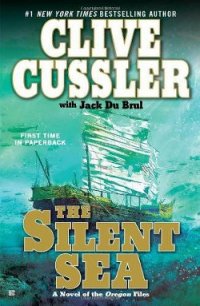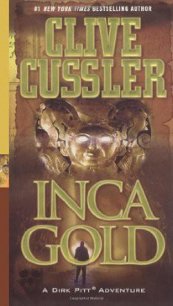Skeleton Coast - Cussler Clive (книги txt) 📗
“We’d best get going,” Ryder said. They’d been traveling under the relatively cool cover of darkness.
“We can cover a few miles before the sun climbs too high.”
“I think we should make camp here,” said Peter Smythe, the greenest member of the group, and by far the worst off. He’d lost his swaggering attitude shortly after entering the sand sea and now moved with the shuffling gait of an old man. White crusts had formed at the corners of his eyes and mouth, while his once bright blue eyes had grown dim.
Ryder glanced at Peter and saw the signs immediately. They’d all shared the same water ration since filling their canteens and jerry cans ten days earlier at a brackish well, but Smythe’s body seemed to need more than the others. It wasn’t a question of strength or will, it was simply the lad needed to drink more to stay alive. H. A. knew to the drop how much water remained, and unless he could find another desert well, Smythe would be the first to die.
The thought of giving him an extra ration never entered Ryder’s mind. “We go on.”
He looked westward and saw the mirror image of the terrain they’d already covered. Sand dune piled upon sand dune in endless ranks that stretched seemingly forever. The sky was turning brassy as light reflected off the infinite desert. Ryder checked his mount. The animal was suffering, and for that he felt guilty—worse than his feelings for young Smythe in fact, for the poor animal had no choice but to carry them across this cruel environment. He used a clasp knife to remove a stone from the horse’s hoof and adjusted the saddle blanket where the pannier straps were beginning to chafe. The animal’s once glossy coat was dull and hung in flaps where its flesh had begun to waste away.
He stroked the horse’s cheek and muttered a few soothing words into its ear. There was no way any of them could ride their mounts. The animals were already struggling under their lightened loads. He took up the reins and started off. Ryder’s boots sank to the uppers as he led the horse down the face of a dune.
Sand shifted under them, hissing and sliding down the embankment, and threatening to send the pair tumbling if either took a misstep. H. A. didn’t look back. The men had no choice but to follow or die where they stood.
He walked for an hour as the sun continued its inexorable climb into the cloudless sky. He’d tucked a smooth pebble between his teeth and tongue to try to fool his body that he wasn’t severely dehydrated.
When he paused to wipe the inside of his big slouch hat the heat scorched the red patch of skin on the crown of his head. He wanted to go for another hour but he could hear the men struggling behind them.
They weren’t yet at the point where he would consider abandoning them, so he led them to the lee of a particularly tall dune and began to erect a sunshade using the horse blankets. The men flopped to the ground, panting as he set up their meager camp.
H. A. checked on Peter Smythe. The young man’s lips were nothing but raw blisters that leaked clear fluid and the tops of his cheeks were burned as if with an iron straight from the brazier. Ryder reminded him to only loosen his boot laces. All of their feet were so swollen that to remove their boots meant they’d never get them back on again. They watched him expectantly as he finally took a couple of canteens from a saddlebag. He unstoppered one of them and immediately one of the horses nickered at the scent of water. The others crowded over and his own mount brushed its head against H. A.’s shoulder.
So as not to lose even a single drop, Ryder poured a measure into a bowl and held it for the animal to drink. It slurped noisily and its stomach rumbled as water reached it for the first time in three days. He poured out a little more and again watered the horse. He did this to all of them first despite his own raging thirst and the angry glares of his companions.
“They die, you die” was all he had to say, for they knew he was right.
Having drunk only a quart of water each, the horses could still be cajoled to eat from the feed bags of oats one of them had carried. He hobbled them with leg ropes and only then did he pass around the bowl for the men to drink. He was even stricter with their ration, each receiving a single mouthful before Ryder secured the water in his pannier. There were no protests. H. A. was the only one of them to have crossed this desolate wasteland before and they deferred to him to see them through.
The shade of the horse blankets was pitiably small compared to the searing oven that was the Kalahari, one of the hottest and driest places on earth, a land where the rain might fall once a year or not for many.
As the sun beat the earth with hammer strokes of heat, the men lay in torpid lethargy, shifting only when the shadows moved with the revolving sun to expose a hand or leg to the brutal onslaught. They lay with their all-consuming thirst, and they lay with their pain, but mostly they lay with their greed, for these were still motivated men, men close to becoming far wealthier than any had imagined.
When the sun reached its zenith it seemed to gain strength, making the act of breathing a battle between the need for air and the desire to keep the heat from entering their bodies. It sucked moisture from the men with each shallow breath and left their lungs aflame.
And still the heat had increased, a smothering weight that seemed to crush the men into the ground.
Ryder didn’t remember it being this bad when he had crossed the desert all those years ago. It was as if the sun had fallen from the heavens and now lay upon the earth, raging and angry that mere mortals were trying to defy it. It was enough to drive a man insane, and yet they endured the long afternoon, praying for the day to finally end.
As swiftly as the heat had built up it began to drop as the sun finally settled toward the western horizon, painting the sand with bands of red and purple and rose. The men slowly emerged from under the sunshade, brushing dust off their filthy clothes. Ryder scaled the dune that had protected them from the wind and panned the desert behind them with a collapsible brass telescope for signs of their pursuers. He could see nothing but shifting dunes. Their tracks had been scoured clean by the constant zephyrs, though it gave him little comfort. The men chasing them were some of the best trackers in the world. They would find them in the featureless sand sea as surely as if Ryder had left a trail of marker stones for them to follow.
What he didn’t know was how much ground their stalkers had gained during the day—for they seemed superhuman in their abilities to withstand the sun and heat. H. A. had estimated that when they entered the desert they had a five-day lead on their pursuers. He felt confident that they held no more than a day’s advantage now. By tomorrow that would be whittled further to half a day. And then? The next day would be when they would pay for abandoning their weapons when the packhorse went lame.
Their only chance was to find enough water tonight for the horses so they could ride them once again.
Not enough of the precious fluid remained to water the horses, and the men’s ration was half of what they’d had just after dawn. For Ryder it was like adding insult to injury. The warm trickle seemed to just seep into his tongue rather than slake his thirst, which was now a gnawing ache in his stomach. He forced himself to eat some dried beef.
Looking at the raw-boned faces around him, H. A. knew that tonight’s march was going to be torture.
Peter Smythe couldn’t stop himself from swaying where he stood. Jon Varley wasn’t much better off.
Only the brothers, Tim and Tom Watermen, seemed okay, but they had been in Africa longer than Smythe or Varley, working as farmhands on a big Cape cattle ranch for the past decade. Their bodies were more acclimated to Africa’s brutal sun.




